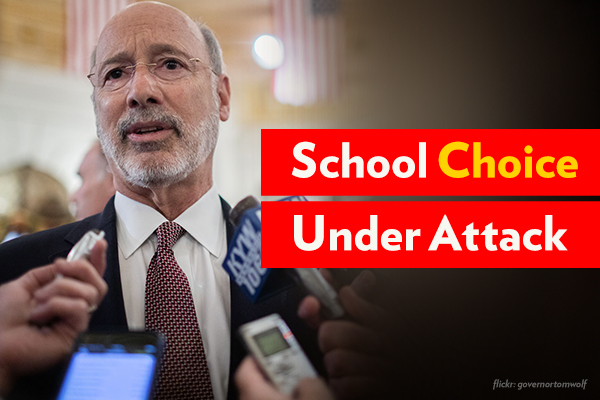Media

Conscientious Objectors to Choice
Once again, the most vulnerable in our Commonwealth are in a battle without fully realizing it.
That was clear to me during my testimony before the Pennsylvania Senate’s Education Committee and an exchange between Senator Lindsey Williams and myself concerning education funding for the thousands of students that attend charter schools in the state.
What PDE (i.e., Pennsylvania Department of Education) told me, Williams stated, was a small amount of, let’s call them conscientious objectors, school districts that voted down, sometimes unanimously in their local school a charter and then CAB [Charter school Appeal Board] approved it over their objections. And so they just routinely don’t send the payments and there’s a small minority of them.
Like you, when I heard this, my mind immediately went to the definition of “conscientious objector”:
con·sci·en·tious ob·jec·tor (/ˌkänCHēˈˌen(t)SHəs ˈäbjektər/)
noun
-a person who for reasons of conscience objects to complying with a particular requirement, especially serving in the armed forces.
From there, I asked myself:
Does she mean that these school districts are not willing to fight for the best solutions for those most in need—even when it’s required by law?
Or, perhaps, did Senator Williams choose this war-related phrase because, in fact, there is a war initiated by school districts to stop those who need good charter schools from attending them?
Her revealing choice of words made me realize that while many of us see school choice as a chance to save lives, others see it as a war to be won at all costs.
Today charter schools and the students they serve are under attack from all sides. In the past two years, at least 15 charter school applications have been denied across Pennsylvania. In July, Governor Wolf issued 11 executive actions that increase the cost and bureaucracy required to run a charter school, including efforts to cap charter school enrollment. Adding insult to injury, when districts break the law and refuse to fund their charter students, as Sen. Williams mentioned in the hearing, the governor is charging the charter schools a fee.
Nationally, Democrats who historically supported charters—like Senator Cory Booker—now distance themselves as they vie for the presidency. All the while, some of the most disadvantaged children in Pennsylvania are caught in the middle—political pawns in the larger war over funding.
Pennsylvania charter school students disproportionately serve low-income and minority children. Any attempts—through “conscientious objection” or other devices—to close or constrain these schools hurts these vulnerable kids the most. As I noted in my testimony:
Any discussion about charters in Pennsylvania must always remember that these schools serve four times the percentage of African-American children than traditional public schools do in a state that has some of the worst quality-of-life indicators for Blacks in the nation. Charters also disproportionately serve Latinos and high-poverty schoolchildren.
Graph: Pa Charters Serve a Higher Percentage of Minority and Low Income Students
If you really think about it, that’s pretty unconscionable.
At the hearing I explained to Senator Williams:
There is a law for a reason, and what you are doing particularly is holding back kids in need at McKeesport and Woodland Hills. . . [they] have go to PDE to get their opportunity for academic equality.
Still Sen. Williams attempted to justify rule-breaking districts by suggesting charter schools weren’t following the rules:
. . . PDE was saying these schools, charter schools that weren’t talking to their home districts, and they were just getting a bill, and they were just sending it directly to PDE. . . They were using PDE as their billing process. . . the vast majority are abusing the PDE system.
But this is incorrect. Per state law, PDE requires charter schools to send all invoices to the districts. Moreover, a Right to Know request to the department showed every one of the 13,677 petitions filed by charter schools seeking tuition payments over the past year were approved. In other words, the districts—not the charter schools—were at fault for not paying legitimate costs.
Graph: Districts Withhold Charter Funds
Withholding these funds meant to educate kids is not a moral choice. It is both unethical and illegal. Using the term “conscientious objector” not only invokes the war mentality, but also prompts the question: is fighting to keep education funding away from the most-disadvantaged students in Pennsylvania a “just war”, or is it just another misguided fight for dollars by school districts and teachers’ unions at the sake of poor (and often Black and Brown) children?
No one can predict when—or if—defending charter schools will come back into style for politicians. But following a just law that benefits children is never optional—regardless of how flowery the “objection” may sound.